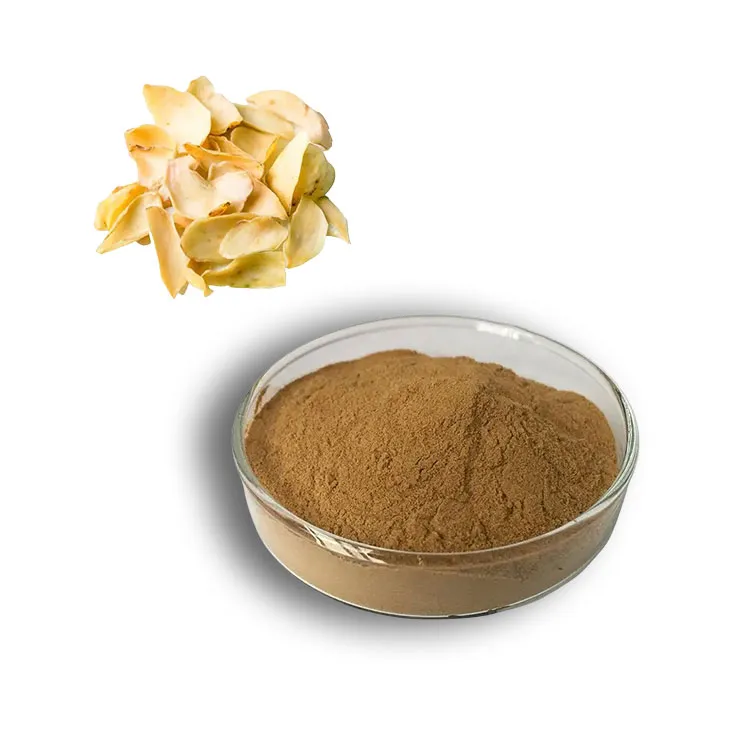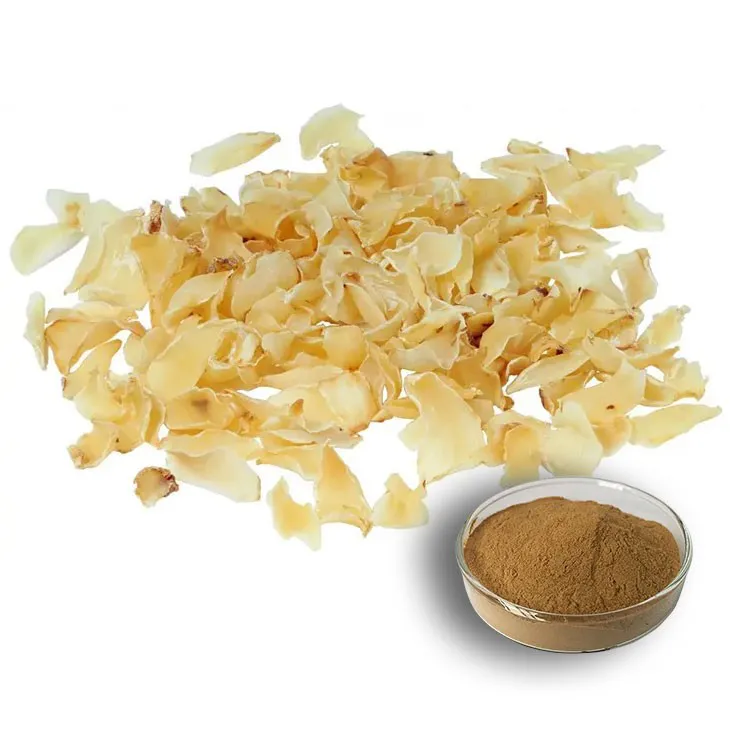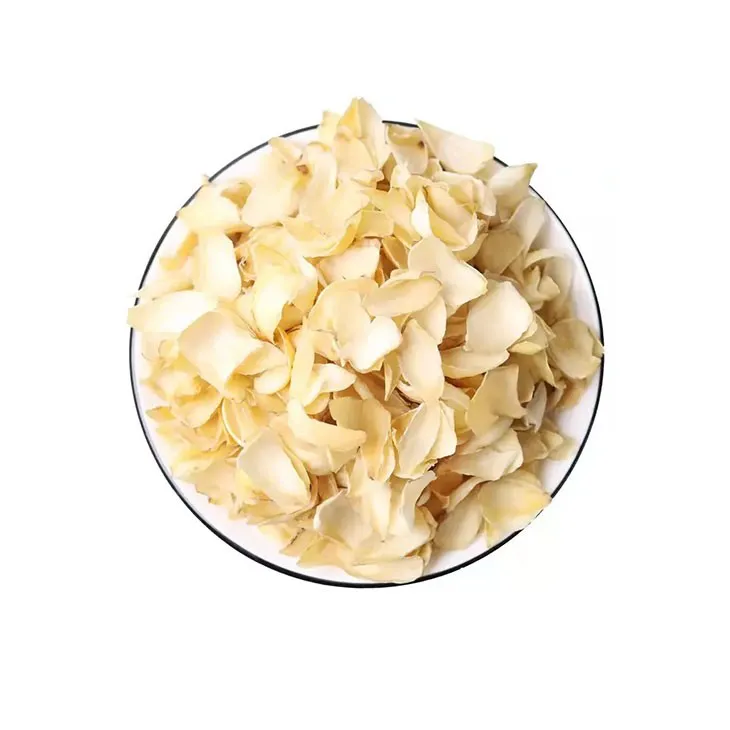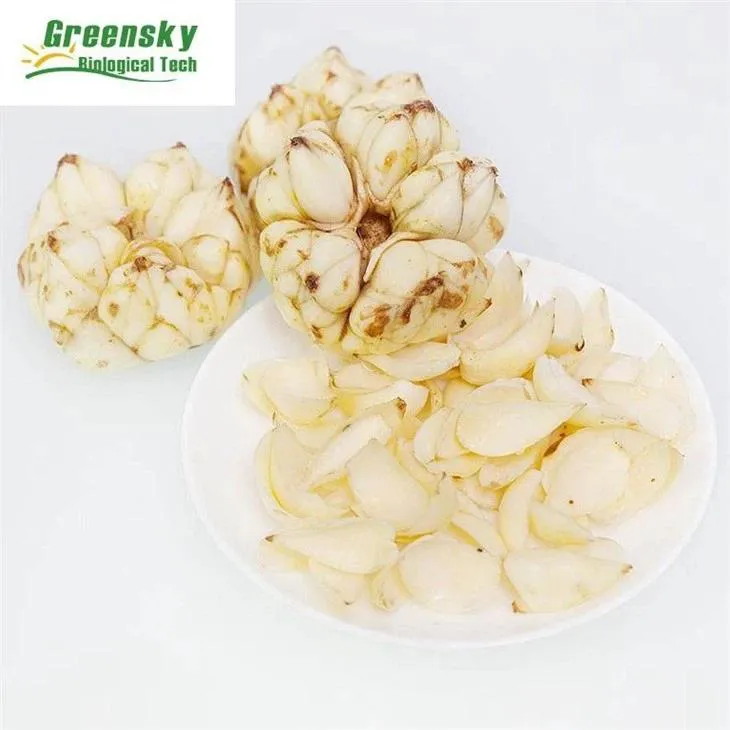- 0086-571-85302990
- sales@greenskybio.com
Nutritional Riches of Lily Extract: Unveiling Health Benefits
2024-07-04

1. Introduction
Lily extract has long been recognized in traditional medicine for its potential health - promoting properties. In modern times, scientific research has started to uncover the various nutrients and bioactive compounds within it that contribute to these effects. This article aims to provide a comprehensive overview of the nutritional profile of Lily extract and the scientific evidence behind its health benefits.

2. Nutritional Profile of Lily extract
2.1 Carbohydrates
Lily extract contains a significant amount of carbohydrates. These carbohydrates are an important source of energy for the body. Complex carbohydrates in lily extract are gradually broken down during digestion, providing a sustained release of energy. This can be particularly beneficial for those who need a stable energy supply throughout the day, such as athletes or individuals with active lifestyles.
2.2 Proteins
Proteins are also present in lily extract. Although not as abundant as in some other plant - based sources, the proteins in lily extract play a crucial role in the body. They are involved in building and repairing tissues, including muscle tissue. Additionally, proteins are necessary for the production of enzymes and hormones, which regulate various physiological processes in the body.
2.3 Vitamins
Lily extract is a rich source of various vitamins. For instance, it contains vitamin C, which is well - known for its antioxidant properties. Vitamin C helps protect cells from damage caused by free radicals, which are unstable molecules that can lead to oxidative stress. It also plays a role in collagen synthesis, which is important for healthy skin, joints, and connective tissues.
Another important vitamin found in lily extract is vitamin B complex. The B vitamins, including thiamine (B1), riboflavin (B2), and niacin (B3), are involved in energy metabolism. They help convert food into energy that the body can use. Deficiencies in these vitamins can lead to fatigue, weakness, and other health problems.
2.4 Minerals
Minerals such as potassium, magnesium, and calcium are present in lily extract. Potassium is essential for maintaining proper heart function and regulating blood pressure. It also helps in nerve function and muscle contraction. Magnesium is involved in over 300 enzymatic reactions in the body, including those related to energy production, DNA synthesis, and protein synthesis. Calcium is crucial for strong bones and teeth, as well as for proper muscle function and nerve transmission.

3. Health - Promoting Properties of Lily Extract
3.1 Skin Health
The nutrients in lily extract offer several benefits for skin health. As mentioned earlier, vitamin C is important for collagen synthesis. Collagen is a protein that gives skin its elasticity and firmness. By promoting collagen production, lily extract can help reduce the appearance of wrinkles and fine lines, making the skin look more youthful.
Additionally, the antioxidants in lily extract, such as vitamin C and other phenolic compounds, help protect the skin from environmental damage. Exposure to sunlight, pollution, and other environmental factors can generate free radicals in the skin, which can lead to premature aging, dark spots, and other skin problems. The antioxidants in lily extract can neutralize these free radicals, reducing the risk of such skin damage.
3.2 Stress Reduction
Some of the bioactive compounds in lily extract may have stress - reducing properties. Flavonoids, which are present in lily extract, have been shown to have anti - stress effects in some studies. These compounds may help regulate the body's stress response by modulating the release of stress hormones such as cortisol.
When the body is under stress, cortisol levels increase. Prolonged elevation of cortisol can have negative effects on the body, including weakened immune function, increased blood pressure, and disrupted sleep patterns. By reducing stress, lily extract may help mitigate these negative effects and promote overall well - being.
3.3 Support for Internal Systems
Digestive System: Lily extract may support the digestive system in several ways. The dietary fiber present in it can help promote regular bowel movements, preventing constipation. Additionally, some of the bioactive compounds in lily extract may have anti - inflammatory properties, which can be beneficial for the gut. Inflammation in the digestive tract can lead to various digestive problems, such as irritable bowel syndrome (IBS) and gastritis.
Immune System: The vitamins and minerals in lily extract play an important role in supporting the immune system. Vitamin C, for example, is known to enhance the function of white blood cells, which are the body's first line of defense against infections. Zinc, another mineral that may be present in lily extract, is also crucial for immune function. It is involved in the production and function of immune cells.
Cardiovascular System: The potassium and magnesium in lily extract are beneficial for the cardiovascular system. As mentioned earlier, potassium helps regulate blood pressure. High blood pressure is a major risk factor for heart disease. Magnesium also plays a role in maintaining normal heart rhythm and reducing the risk of arrhythmias.

4. Scientific Evidence
Over the years, numerous scientific studies have been conducted to investigate the health benefits of lily extract. For example, in vitro studies have shown that the antioxidants in lily extract can effectively scavenge free radicals. These studies involve testing the extract in a test tube or Petri dish environment to observe its chemical reactions with free radicals.
Animal studies have also provided valuable insights. In some animal models, lily extract has been shown to improve skin health by increasing collagen production. These studies typically involve treating animals with lily extract and then analyzing skin samples for changes in collagen levels.
Although human studies are relatively limited, some small - scale clinical trials have been carried out. In one study, participants who consumed lily extract supplements reported reduced stress levels compared to the control group. However, more large - scale, long - term human studies are needed to fully confirm the health benefits of lily extract.

5. How to Incorporate Lily Extract into Your Diet
There are several ways to incorporate lily extract into your diet. One option is to use lily - based supplements. These are available in the form of capsules or tablets and can be easily added to your daily routine. However, it is important to choose high - quality supplements from reliable sources to ensure safety and effectiveness.
Another way is to consume lily - containing foods. For example, lily bulbs can be used in cooking. They can be added to soups, stir - fries, or stews. Lily - flavored teas are also available, which can be a convenient and enjoyable way to get the benefits of lily extract.
6. Precautions and Considerations
While lily extract has many potential health benefits, there are also some precautions to keep in mind. Some people may be allergic to lily products. Allergic reactions can range from mild symptoms such as itching and rash to more severe symptoms like difficulty breathing. If you have a known allergy to lilies, it is best to avoid lily extract.
Additionally, if you are taking medications, it is important to consult your doctor before starting to use lily extract supplements. There may be potential interactions between lily extract and certain medications, such as blood - thinning drugs or medications for diabetes.
7. Conclusion
Lily extract is a natural product rich in nutrients and bioactive compounds that offer a range of potential health benefits. From promoting skin health to reducing stress and supporting internal systems, the scientific evidence is gradually building to support its use. However, more research is still needed, especially in the area of human studies. By understanding the nutritional profile and health - promoting properties of lily extract, individuals can make informed decisions about incorporating it into their diet or lifestyle, while also being aware of the necessary precautions.
FAQ:
What are the main nutrients in lily extract?
Lily extract contains various nutrients. It typically has vitamins such as vitamin C and some B - vitamins. It also contains minerals like potassium and magnesium. Additionally, it may have bioactive compounds including flavonoids which contribute to its health - promoting properties.
How does lily extract benefit skin health?
The flavonoids and other bioactive compounds in lily extract can have antioxidant effects on the skin. Antioxidants help to combat free radicals which can damage skin cells. This may lead to reduced signs of aging, such as wrinkles and fine lines. It may also help in improving skin hydration and maintaining skin elasticity.
Can lily extract really reduce stress?
Some studies suggest that certain compounds in lily extract may have a calming effect on the body. It might interact with the body's stress response systems, perhaps by influencing neurotransmitter levels. However, more research is needed to fully understand the mechanisms and the extent of its stress - reducing capabilities.
What internal systems does lily extract support?
Lily extract can support the immune system due to its nutrient content. The vitamins and minerals play important roles in maintaining a healthy immune response. It may also support the digestive system. For example, its fiber - like components could potentially aid in digestion and gut health.
Is lily extract safe for everyone to consume?
While lily extract is generally considered safe for most people, some individuals may be allergic to it. Pregnant or breastfeeding women should also consult a healthcare provider before consuming lily extract, as there may be potential effects on the fetus or infant. People with certain medical conditions should also exercise caution.
Related literature
- The Nutritional and Therapeutic Potential of Lily Extracts"
- "Lily Extract: A Review of its Health - Benefits"
- "Nutraceutical Properties of Lily - based Extracts"
- ▶ Hesperidin
- ▶ citrus bioflavonoids
- ▶ plant extract
- ▶ lycopene
- ▶ Diosmin
- ▶ Grape seed extract
- ▶ Sea buckthorn Juice Powder
- ▶ Beetroot powder
- ▶ Hops Extract
- ▶ Artichoke Extract
- ▶ Reishi mushroom extract
- ▶ Astaxanthin
- ▶ Green Tea Extract
- ▶ Curcumin Extract
- ▶ Horse Chestnut Extract
- ▶ Other Problems
- ▶ Boswellia Serrata Extract
- ▶ Resveratrol Extract
- ▶ Marigold Extract
- ▶ Grape Leaf Extract
- ▶ blog3
-
Aguaje Extract
2024-07-04
-
Curcuma Longa Extract/Turmeric extract
2024-07-04
-
Tormentil Extract
2024-07-04
-
Quercetin
2024-07-04
-
Ivy Extract
2024-07-04
-
Kidney Bean Extract
2024-07-04
-
Tongkat Ali Extract
2024-07-04
-
Gynostemma pentaphyllum extract
2024-07-04
-
Sophora Japonica Flower Extract
2024-07-04
-
Kelp Extract Powder
2024-07-04





















